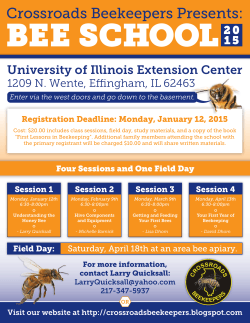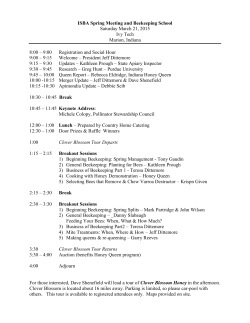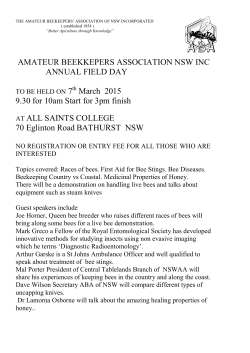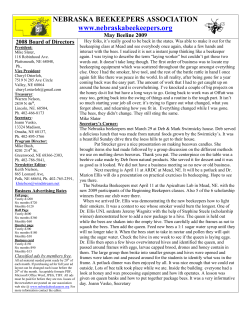
Beekeeping in Haryana and Uttar Pradesh: A - DU E
DU Journal of Undergraduate Research and Innovation Volume 1 Issue 2, Page 365-373 Beekeeping in Haryana and Uttar Pradesh: A comparative study Sonal Gupta*, Kishan Sachdeva, Ramashankar Kushwaha sonal775@gmail.com; pskscav@gmail.com; rsmoon.kushwaha@gmail.com Hansraj College, University of Delhi, Delhi -110007, India ABSTRACT Beekeeping significantly contributes in the diversification of agriculture and presents an excellent opportunity to farmers to earn additional income as it does not involve a high level of investment and is not labour intensive too. The present study is an attempt to distinguish between the people in terms of their willingness and help in acquiring the mindset of people about beekeeping as a subsidiary occupation. People centric survey was carried out in Uttar Pradesh and Haryana states of India. Two villages from each state were picked through convenience sampling to understand and compare the prospects of beekeeping and information was acquired through questionnaires, observation and personal interviews. Although Haryana is very similar to Uttar Pradesh both in terms of agricultural conditions and social relations but the study reveals quite contrasting results in terms of people‟s perception about beekeeping. Respondents from Uttar Pradesh are found more aware and have shown greater willingness to take up beekeeping as an additional source of income. Whereas, in contrast to Uttar Pradesh, people of Haryana majorly are found satisfied with their agricultural incomes and have shown their reluctance towards beekeeping. Various challenges faced by both current and prospective beekeepers are also highlighted in the study. Lack of protection facilities regarding theft, lack of insurance coverage with respect to bees and bee boxes, indiscriminate use of pesticides, problems during migration of honey bee colonies, harmful radiations from mobile towers, less awareness about Government support, are found to be major limiting factors in pursuing beekeeping.The present study can be proved as of great help to policy makers and Government authorities to take up the issues and problems seriously so that the potential beekeepers can reap the benefits of beekeeping. Keywords: agriculture, beekeeping INTRODUCTION Apiculture commonly known as beekeeping is the maintenance of artificial bee hive colonies with the objective of producing honey and it‟s by- products. ”Bees” is the second largest topic of research after humans. India is an agricultural economy. Bee keeping significantly contributes in the diversification of agriculture. Ninety percent pollination in agricultural crops in the world is being carried out by the bees only, and in its absence, the total production in agricultural crops and fruits will be reduced to one- fourth. (1). Besides pollination, beekeeping also proves as an 365 additional source of income with low investments and high returns. Moreover, Honeybees are the only insects that provide food for humans. From honey to bee wax, from parag, royal jelly to propolis nearly every product of bee is useful and of great value for their varied uses. It is therefore necessary to promote beekeeping. There have been a lot of studies on beekeeping earlier. Young, educated and people living in joint families continue with the profession of beekeeping. (3,4). The studies rarely highlighted any comparison regarding beekeeping between different states of India. The present study is therefore, a step towards this direction and attempts to compare the attitudes about beekeeping and to explore the hurdles restricting people in taking up beekeeping in Uttar Pradesh and Haryana states of India. METHODOLOGY The economy of Haryana and Uttar Pradesh is largely agricultural based. A purposive research was carried out to gain an in-depth understanding of informant‟s responses. Two villages each from Uttar Pradesh and Haryana states of India were picked through convenience sampling. Within the constraints, the sample of the study was drawn from villages- Naglagujju and Shaulana (Hapur District) of Uttar Pradesh and villages- Aterna (Sonipat District) and Chandu (Gurgaon District) of Haryana state of India. In the present study, primary data is collected through questionnaire. Survey method and face to face procedure was adopted and all respondents were contacted and interviewed personally. We also analyzed the responses through observations. Each sample group consists of 35 respondents from each state. The groups have been compared with respect to variables like Age distribution, Family size, Occupation, Awareness of Beekeeping, Awareness of National Bee Board, Awareness of Government support through subsidies and Willingness to take up beekeeping as an occupation. The time period of our study ranges from Jan 2014 to Nov 2014. The present study is limited to a few districts of Haryana and Uttar Pradesh only. Since the villagers had little incentive to share their actual occupational and income structures, the data remained incomplete. The study could be diversified by adding more variables such as the land holdings, income and educational qualifications of the villagers. RESULTS AND FINDINGS The demographical profile and contextual matrix of responses of the sample groups of Uttar Pradesh and Haryana states is shown in Table I. The sample size consists of 35 male respondents each from Uttar Pradesh and Haryana states of India. Females are found responsible for the household chores and few of them make artistic things at home to sell in the market, so not covered as informants in the present study. Age distribution of our sample size shows 11.43% people from Uttar Pradesh and only 2.86 % people from Haryana are below the age of 20, 65.71% and 77.14% belong to the age group of 20Table I. Demographical profile and Contextual matrix of responses of the sample groups of Uttar Pradesh and Haryana states 366 40, rest 22.86% and 20.0% people belong to the age group of 40-60 from Uttar Pradesh and Haryana states respectively. In Uttar Pradesh 20% informants have 2-4 members in the family, 48.57% respondents have 5-6 No. 1 2 3 4 5 6 7 8 Variable Gender Male Female Age Below 20 20-40 40-60 Family Size 2-4 5-6 7-8 Above 8 Occupatio n Beekeeper +Farmer Farmer Student Other Awarenes s of Bee Keeping Yes No Awarenes s of National Bee Board Yes No Awarenes s of Governme nt support through Subsidies Yes No Willing to take up Bee Keeping as a Profession Yes No Uttar Pradesh N=35 Haryana N=35 Total N=70 35 (100) 0 35 (100) 0 70 (100) 0 4 (11.43) 23 (65.71) 8 (22.86) 1 (2.86) 27 (77.14) 7 (20) 5 (7.14) 50 (71.43) 15 (21.43) 7 (20) 17 (48.57) 8 (22.86) 3 (8.57) 6 (17.14) 18 (51.43) 9 (25.71) 2 (5.71) 13 (18.57) 35 (50) 17 (24.29) 5 (7.14) 6 (17.14) 23 (65.71) 3 (8.57) 3 (8.57) 1 (2.86) 34 (97.14) 0 0 7 (10) 57 (81.42) 3 (4.29) 3 (4.29) 29 (82.86) 6 (17.14) 8 (22.86) 27 (77.14) 37 (52.86) 33 (47.14) 14 (40) 21 (60) 1 (2.86) 34 (97.14) 15 (21.42) 55 (78.57) 15 (42.86) 20 (57.14) 3 (8.57) 32 (91.43) 18 (25.71) 52 (74.28) 34 (97.14) 1 (2.86) 14 (40) 21 (60) 48 (68.57) 22 (31.43) 367 members in the family, 22.86% people live in family size of 7-8 member per family, and at the end there are 8.57% which have above 8 people in their family. On the same lines Haryana also shows the same trend in family size. 17.14% people live in family of 2-4 members, 51.43% people have 5-6 members per family, 25.71% people account for 7-8 members and only 5.71% people have more than 8 members in the family. The present study rested on the following contrasting results: Basis Trends in Uttar Pradesh Trends in Haryana 1. Occupatio n 65.71% people are engaged in farming to earn their livelihood. 97.14% people are very much involved in farming and mushroom cultivation and are the ones who are well off with their earnings from farming. 17.14% people have taken up bee keeping also along with farming. 8.57% people are students who are studying horticulture; this is small yet significant proportion of the population. They are further very keen in taking up bee keeping as their profession. O Only 2.86 % people pursue beekeeping along with farming, that too on small scale. . We also came across 8.57% traders who are interested in taking up bee keeping as profession seeing the huge profits in this venture. 2. Awareness of Bee Keeping Since there are a significant number of people involved in the profession of bee keeping, 82.86% people are aware about bee keeping and the benefits they can reap out of it and therefore can be motivated to take up bee 368 Result shows 22.86% people about beekeeping. only know The figure can be computed to 77.14%, who are not even familiar with the word beekeeping. More over observed quite A keeping, though some might not have a thorough knowledge of the same. disinterested in knowing much about beekeeping as an opportunity. Trends also shows 17.14% of the people are not much aware about it but seems very positive to the idea of bee keeping. 3. Awareness of National Bee Board 4. Awareness of Governme nt support through Subsidies 5. Willing to take up Bee Keeping as National Bee Board is one of the very eminent board working towards the welfare of the bee keepers. Yet the awareness about the same was found limited to 40% and the most surprising factor came across is that people already practicing bee keeping too don‟t know much about it. Percentage of people aware about National Bee Board has found negligible. The „Sarpanch‟ only of village Aterna, One out of 35 respondents- i.e. 2.86% knows little about it. Only 42.86% people have knowledge of support and subsidies offered by government with respect to beekeeping. Haryana has proved to be a state where knowledge about the government support and subsidies for beekeeping is least-8.57% people have heard of it. Rest 57.14% which even includes people actually involved in the profession of beekeeping do not know exactly what kind of support Government provides for beekeeping. Though they have rough idea about some subsidies. 91.43% of the respondents have no clue about the efforts of Government with respect to beekeeping. 97.14% people have shown their keen interest in taking up bee keeping as a profession. Catering to the huge advantages The result outlines- 40% respondents have shown their willingness in taking up bee keeping as a profession, but their 369 A Rest 97.14% has not even heard about the same. A W a Profession that it offers and seeing other farmers already involved in the profession many new famers are willing to take up the same. interest has appeared a bit low due to the presence of many hindrances in their area. 60% people have been found very reluctant in taking up any new venture including beekeeping. Firstly, it has been observed that people into farming are very much satisfied with their earnings and found enough to support their family. Catering to a number of other factors that do not allow them to have very smooth bee keeping Majorly includes harmful radiations from mobile towers. Undoubtedly beekeeping has shown lot of potential with different shades and colour in the states of Uttar Pradesh and Haryana. Yet through survey and interview methods, it has been observed that the profession and practice of beekeeping suffers from a number of shortcomings experienced by beekeepers in the two states. CHALLENGES IN BEEKEEPING Theft of bee boxes The most common challenge reported was of theft. Bee boxes are kept in the open farms where 24 hours care is not possible. As a consequence, not just the bee boxes land up in the hands of culprits but also number of expensive equipment/tools used in beekeeping (2). This shakes their strength and demotivates beekeepers to continue beekeeping. Lack of Insurance Coverage Another common problem reported was of lack of Insurance coverage to beekeepers with respect to the bees and bee boxes. Moreover, lack of awareness about existing policies for beekeepers gave them no base to take risk on or to try to invest potential resources into beekeeping. Insurance is of prime importance from beekeeper‟s point of view as it does not only provide monetary 370 backbone but also provides sense of security. This discouraging factor make them unable to cope up with contingencies and force them to give up beekeeping unwillingly. Problems in Migration of Honey bee colonies Migration of bee colonies is a way of capitalizing on different bee floral sources or to establish a new bee colony at some new location. The interaction with respondents exposed problems faced by beekeepers in migration. High transport cost and mortality of bees during transit are not only issues but monetary teasing by police is a major concern in migration of honey bee colonies. The conclusion that can be drawn is that only the beekeepers with capital in hand are able to migrate successfully. Indiscriminate use of Pesticides Majority of respondents stated that though the use of pesticides on crops is important but at the same time their excessive use kills honeybees and leads to unwanted result turning beekeeping into a loss-making venture. It is hard hitting fact to the infant beekeeper who desires to take it up as a profession. Harmful radiations from Mobile Towers In our interactions with farmers we gathered that there has been a decline in the number of bee colonies in the past few years. One particular reason stated by respondents in Haryana is the increasing number of Mobile towers in and around their area. Radiation from mobile towers distracts the bees and also leads to extinction of the bee species. A recent research conducted by environmentalist and zoologist Dr. Sainudeen Pattazy shows that the electromagnetic radiation from mobile towers and cell phones cripples the “navigational skills” of the worker bees that go out to collect nectar from flowers to sustain bee colonies. The research also suggested that if the current scenario does not change soon, the whole species of bees might be wiped out from the state of Kerala within a decade. Lack of awareness about Government support A crucial fact discovered in the research is that not much of the respondents are aware of National Bee Board and support offered by Ministry of Agriculture, Government of India and feel disconnected with the Government efforts. The most disturbing out of all is that the beekeepers themselves are ignorant of registering with the bee board which would entail them to smoother transportation and migration of bee colonies and at the same time provides assistance, training and subsidies for beekeeping. This seems to be a major challenge to initiate or pursue beekeeping. CONCLUSION & RECOMMENDATIONS There is vast potential for beekeeping in the country. However, due to lack of knowledge, and many challenges that are faced, scientific beekeeping is still in its infancy stage and not being practiced by the beekeepers. Many people living in the rural areas are unaware of the fact that beekeeping is not only an excellent source of employment for the rural population but also an additional source of income for the low income earning farmers. People centric surveys like these 371 can be used as a tool in distinguishing between the people in terms of their willingness and help in acquiring the mindset of people about beekeeping as a subsidiary occupation. In a nutshell the beekeeping process suffers from a number of loopholes that add to the hurdles faced by the beekeepers in India. Not only does it hinder the progress of honey extraction but also discourages entrepreneurial spirit among the young beekeepers at the infancy level of beekeeping. The study highlighted major challenges in pursuing beekeeping by beekeepers in Haryana and Uttar Pradesh states of India. Lack of protection facilities regarding theft and insurance policies, indiscriminate use of pesticides, problems during migration, mobile towers radiations, less awareness about Government support, was found to be major limiting factors in pursuing beekeeping. National Bee Board was reconstituted in 2006 under Department of Agriculture & Cooperation, Ministry of Agriculture, Government of India, with the main objective of overall development of beekeeping. National Bee Board takes care of from registration to training and provides assistance and subsidies to beekeepers. The study strongly recommends that awareness programs should be organized to make people aware and to promote beekeeping. Farmers should be motivated for trainings and registrations. Moreover farmers should be educated accordingly so that they must take adequate precautions in usage of pesticides. During the course of the study, Lack of Insurance coverage with respect to the bees and the bee boxes was conveyed to the Director of National Bee Board- Dr. B.L.Saraswat and to the Executive Director of Horticulture – Sh. S.K. Singhla and were requested for introduction of required insurance schemes covering bees and bee boxes. Regular reminders and updates for the same are recommended. The present study can be proved as of great help to policy makers and Government authorities to take up the issues and problems seriously so that the potential beekeepers can realize its benefits. The immense scope in this field calls for more attention towards it. More studies like these on a larger scale will help in increasing the awareness about beekeeping and encourage farmers to take up beekeeping as a subsidiary occupation. It is not only important to identify the important regions for beekeeping but it is also important to identify people who can carry forward this process with ease. ACKNOWLEDGMENTS First of all we are thankful to the Almighty. This research paper has been made possible through the financial support of the Research Council, University of Delhi. We thank them for giving us this opportunity. We whole heartedly express our gratitude towards Dr. V.K Kawatra, the (offg.) Principal of Hans Raj College, for his constant support. Also, the staff and students of Hans Raj College played a vital role in the present study. Special word of thanks to Dr. Kirti Sharma, Assistant Professor, Marketing, MDI Gurgaon, without her guidance and constructive suggestions, this paper would not have been materialized. Her mentoring was paramount in the completion of the paper. We sincerely acknowledge her valuable cooperation. We are extremely grateful to Sh.S.K Singhla-the Executive Director of the Department of Horticulture, Dr. B.L Saraswat- Director of National Bee Board, and Sh. S.C. Joshi- Bee Keeping scientist for helping us out with our queries. We also appreciate assistance of Mr. Aditya Sharma, 372 the president of Natural Rural & Agricultural Resource Development Institute (NRARDI) and Mr. Rajendra Sharma – a beekeeper of village Naglagujju (U.P) who helped us in understanding the basics of bee keeping. We must conclude that this Research Paper would never have been written without the support, encouragement and prodding of our family members. Many thanks to them. REFERENCES Jain, K. L. and Sihag, R.C. (1987). Supplement your income by adopting beekeeping in Haryana, Haryana Farming. (16), pp.18-19 Karan Bansal, Yashwant Singh, Parampal Singh, (2013). Constraints of Apiculture in India.International Journal of Life Sciences Research (IJLSR). Vol. 1 (Issue 1), pp.1-4 Monga, K. and Manocha, A. (2011). Adoption and constraints of beekeeping in District Panchkula (Haryana), India. Livestock Research for Rural Development. 23(5), pp.1-7 Vaidya, D.N. and Mehta, P.K, (1993). Honeybees as valuable pollinators. Farmer and Parliament. (28), pp.10-12 Book Section Ghosh, G.K. (1994). 'CH- 38 Modern Trends in Beekeeping'. In: (Ed), Beekeeping in India. 1st ed. (pp. 161-164) APH Publishing. Websites access at: www.agriculturesnetwork.org/magazines/india/insects-as-allies/honey-bees-farmers-best-friends www.beehives.info/beekeeping/ http://infochangeindia.org/environment/news/mobile-phone-waves-harmful-to-honeybees.html http://nhm.nic.in/Archive/midhPPT8.pdf http://www.niir.org/books/book/complete-book-on-beekeeping-honey-processing-npcs-boardconsultants-engineers/isbn-9788190568555/zb,,136,a,0,0,a/index.html# 373
© Copyright 2025









